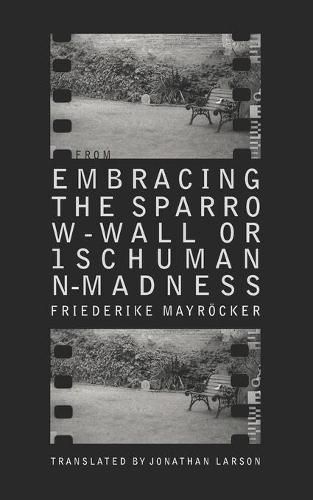Readings Newsletter
Become a Readings Member to make your shopping experience even easier.
Sign in or sign up for free!
You’re not far away from qualifying for FREE standard shipping within Australia
You’ve qualified for FREE standard shipping within Australia
The cart is loading…






Originally written in German by one of Austria’s most important experimental poets, From Embracing the Sparrow-Wall, or 1 Schumann-madness, is a revisionary incantation of the lives of 19th-Century composer Robert Schumann and pianist Clara Schumann, alongside that of the poet herself, Friederike Mayroecker, and her heart-and-hand companion, Ernst Jandl. Initially conceived as a musical performance and published as a textual record of a radio play, this book showcases Mayroecker’s wild, innovative use of language, as well as her unique mode of textual production, in which details and lines from lives and letters are interwoven with her own. In the words of the translator, Jonathan Larson: Robert Schumann’s diary entries set up the source motif, their relations of sexual experience, personal medical history, and artistic musing are all flush sampling materials for Mayroecker to recompose a new text from an old one, as if it were written as a reinterpretation of Robert Schumann’s diaries (‘1 has to feel it, 1 has to feel language, to lay on or take off 1 weight here and there like pharmacist scale, so it must sound, so tuned’).
$9.00 standard shipping within Australia
FREE standard shipping within Australia for orders over $100.00
Express & International shipping calculated at checkout
Originally written in German by one of Austria’s most important experimental poets, From Embracing the Sparrow-Wall, or 1 Schumann-madness, is a revisionary incantation of the lives of 19th-Century composer Robert Schumann and pianist Clara Schumann, alongside that of the poet herself, Friederike Mayroecker, and her heart-and-hand companion, Ernst Jandl. Initially conceived as a musical performance and published as a textual record of a radio play, this book showcases Mayroecker’s wild, innovative use of language, as well as her unique mode of textual production, in which details and lines from lives and letters are interwoven with her own. In the words of the translator, Jonathan Larson: Robert Schumann’s diary entries set up the source motif, their relations of sexual experience, personal medical history, and artistic musing are all flush sampling materials for Mayroecker to recompose a new text from an old one, as if it were written as a reinterpretation of Robert Schumann’s diaries (‘1 has to feel it, 1 has to feel language, to lay on or take off 1 weight here and there like pharmacist scale, so it must sound, so tuned’).